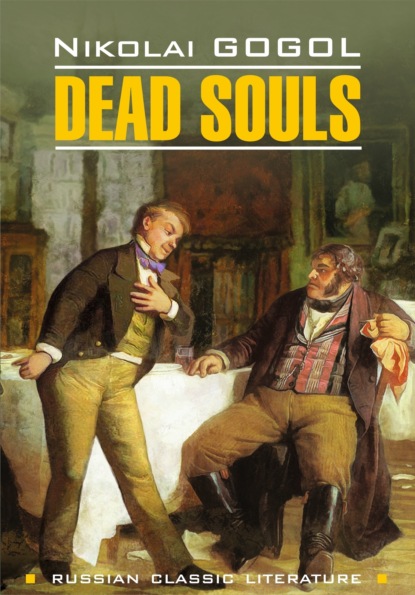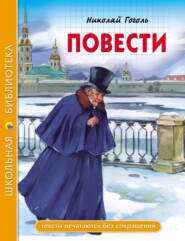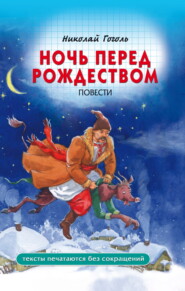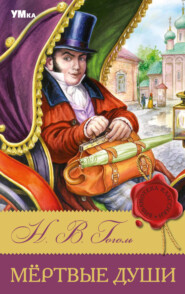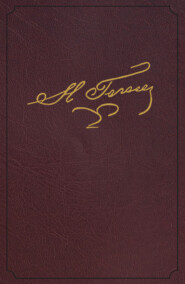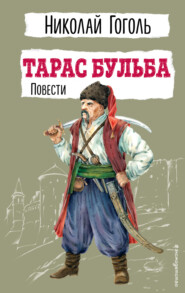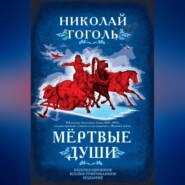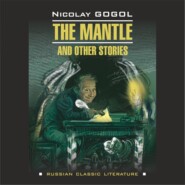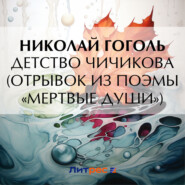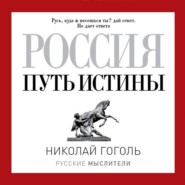По всем вопросам обращайтесь на: info@litportal.ru
(©) 2003-2024.
✖
Мёртвые души / Dead Souls
Жанр
Год написания книги
1842
Теги
Настройки чтения
Размер шрифта
Высота строк
Поля
“Very well,” remarked Chichikov. “Then we need only to agree as to the price.”
“As to the price?” began Manilov, and then stopped. Presently he went on: “Surely you cannot suppose me capable of taking money for souls which, in one sense at least, have completed their existence? Seeing that this fantastic whim of yours (if I may so call it?) has seized upon you to the extent that it has, I, on my side, shall be ready to surrender to you those souls UNCONDITIONALLY, and to charge myself with the whole expenses of the sale.”
I should be greatly to blame if I were to omit that, as soon as Manilov had pronounced these words, the face of his guest became replete with satisfaction. Indeed, grave and prudent a man though Chichikov was, he had much ado to refrain from executing a leap that would have done credit to a goat (an animal which, as we all know, finds itself moved to such exertions only during moments of the most ecstatic joy). Nevertheless the guest did at least execute such a convulsive shuffle that the material with which the cushions of the chair were covered came apart, and Manilov gazed at him with some misgiving. Finally Chichikov’s gratitude led him to plunge into a stream of acknowledgement of a vehemence which caused his host to grow confused, to blush, to shake his head in deprecation, and to end by declaring that the concession was nothing, and that, his one desire being to manifest the dictates of his heart and the psychic magnetism which his friend exercised, he, in short, looked upon the dead souls as so much worthless rubbish.
“Not at all,” replied Chichikov, pressing his hand; after which he heaved a profound sigh. Indeed, he seemed in the right mood for outpourings of the heart, for he continued – not without a ring of emotion in his tone: “If you but knew the service which you have rendered to an apparently insignificant individual who is devoid both of family and kindred! For what have I not suffered in my time – I, a drifting barque amid the tempestuous billows of life? What harryings, what persecutions, have I not known? Of what grief have I not tasted? And why? Simply because I have ever kept the truth in view, because ever I have preserved inviolate an unsullied conscience, because ever I have stretched out a helping hand to the defenceless widow and the hapless orphan!” After which outpouring Chichikov pulled out his handkerchief, and wiped away a brimming tear.
Manilov’s heart was moved to the core. Again and again did the two friends press one another’s hands in silence as they gazed into one another’s tear-filled eyes. Indeed, Manilov COULD not let go our hero’s hand, but clasped it with such warmth that the hero in question began to feel himself at a loss how best to wrench it free: until, quietly withdrawing it, he observed that to have the purchase completed as speedily as possible would not be a bad thing; wherefore he himself would at once return to the town to arrange matters. Taking up his hat, therefore, he rose to make his adieus.
“What? Are you departing already?” said Manilov, suddenly recovering himself, and experiencing a sense of misgiving. At that moment his wife sailed into the room.
“Is Paul Ivanovitch leaving us so soon, dearest Lizanka?” she said with an air of regret.
“Yes. Surely it must be that we have wearied him?” her spouse replied.
“By no means,” asserted Chichikov, pressing his hand to his heart. “In this breast, madam, will abide for ever the pleasant memory of the time which I have spent with you. Believe me, I could conceive of no greater blessing than to reside, if not under the same roof as yourselves, at all events in your immediate neighbourhood.”
“Indeed!” exclaimed Manilov, greatly pleased with the idea. “How splendid it would be if you DID come to reside under our roof, so that we could recline under an elm tree together, and talk philosophy, and delve to the very root of things!”
“Yes, it WOULD be a paradisaical existence!” agreed Chichikov with a sigh. Nevertheless he shook hands with Madame. “Farewell, sudarina,” he said. “And farewell to YOU, my esteemed host. Do not forget what I have requested you to do.”
“Rest assured that I will not,” responded Manilov. “Only for a couple of days will you and I be parted from one another.”
With that the party moved into the drawing-room.
“Farewell, dearest children,” Chichikov went on as he caught sight of Alkid and Themistocleus, who were playing with a wooden hussar which lacked both a nose and one arm. “Farewell, dearest pets. Pardon me for having brought you no presents, but, to tell you the truth, I was not, until my visit, aware of your existence. However, now that I shall be coming again, I will not fail to bring you gifts. Themistocleus, to you I will bring a sword. You would like that, would you not?”
“I should,” replied Themistocleus.
“And to you, Alkid, I will bring a drum. That would suit you, would it not?” And he bowed in Alkid’s direction.
“Zeth – a drum,” lisped the boy, hanging his head.
“Good! Then a drum it shall be – SUCH a beautiful drum! What a tur-r-r-ru-ing and a tra-ta-ta-ta-ing you will be able to kick up! Farewell, my darling.” And, kissing the boy’s head, he turned to Manilov and Madame with the slight smile which one assumes before assuring parents of the guileless merits of their offspring.
“But you had better stay, Paul Ivanovitch,” said the father as the trio stepped out on to the verandah. “See how the clouds are gathering!”
“They are only small ones,” replied Chichikov.
“And you know your way to Sobakevitch’s?”
“No, I do not, and should be glad if you would direct me.”
“If you like I will tell your coachman.” And in very civil fashion Manilov did so, even going so far as to address the man in the second person plural. On hearing that he was to pass two turnings, and then to take a third, Selifan remarked, “We shall get there all right, sir,” and Chichikov departed amid a profound salvo of salutations and wavings of handkerchiefs on the part of his host and hostess, who raised themselves on tiptoe in their enthusiasm.
For a long while Manilov stood following the departing britchka with his eyes. In fact, he continued to smoke his pipe and gaze after the vehicle even when it had become lost to view. Then he re-entered the drawing-room, seated himself upon a chair, and surrendered his mind to the thought that he had shown his guest most excellent entertainment. Next, his mind passed imperceptibly to other matters, until at last it lost itself God only knows where. He thought of the amenities of a life, of friendship, and of how nice it would be to live with a comrade on, say, the bank of some river, and to span the river with a bridge of his own, and to build an enormous mansion with a facade lofty enough even to afford a view to Moscow. On that facade he and his wife and friend would drink afternoon tea in the open air, and discuss interesting subjects; after which, in a fine carriage, they would drive to some reunion or other, where with their pleasant manners they would so charm the company that the Imperial Government, on learning of their merits, would raise the pair to the grade of General or God knows what – that is to say, to heights whereof even Manilov himself could form no idea. Then suddenly Chichikov’s extraordinary request interrupted the dreamer’s reflections, and he found his brain powerless to digest it, seeing that, turn and turn the matter about as he might, he could not properly explain its bearing. Smoking his pipe, he sat where he was until supper time.
Chapter III
Meanwhile, Chichikov, seated in his britchka and bowling along the turnpike, was feeling greatly pleased with himself. From the preceding chapter the reader will have gathered the principal subject of his bent and inclinations: wherefore it is no matter for wonder that his body and his soul had ended by becoming wholly immersed therein. To all appearances the thoughts, the calculations, and the projects which were now reflected in his face partook of a pleasant nature, since momentarily they kept leaving behind them a satisfied smile. Indeed, so engrossed was he that he never noticed that his coachman, elated with the hospitality of Manilov’s domestics, was making remarks of a didactic nature to the off horse of the troika, a skewbald. This skewbald was a knowing animal, and made only a show of pulling; whereas its comrades, the middle horse (a bay, and known as the Assessor, owing to his having been acquired from a gentleman of that rank) and the near horse (a roan), would do their work gallantly, and even evince in their eyes the pleasure which they derived from their exertions.
“Ah, you rascal, you rascal! I’ll get the better of you!” ejaculated Selifan as he sat up and gave the lazy one a cut with his whip. “YOU know your business all right, you German pantaloon! The bay is a good fellow, and does his duty, and I will give him a bit over his feed, for he is a horse to be respected; and the Assessor too is a good horse. But what are YOU shaking your ears for? You are a fool, so just mind when you’re spoken to. ‘Tis good advice I’m giving you, you blockhead. Ah! You CAN travel when you like.” And he gave the animal another cut, and then shouted to the trio, “Gee up, my beauties!” and drew his whip gently across the backs of the skewbald’s comrades – not as a punishment, but as a sign of his approval. That done, he addressed himself to the skewbald again.
“Do you think,” he cried, “that I don’t see what you are doing? You can behave quite decently when you like, and make a man respect you.”
With that he fell to recalling certain reminiscences.
“They were NICE folk, those folk at the gentleman’s yonder,” he mused. “I DO love a chat with a man when he is a good sort. With a man of that kind I am always hail-fellow-well-met, and glad to drink a glass of tea with him, or to eat a biscuit. One CAN’T help respecting a decent fellow. For instance, this gentleman of mine – why, every one looks up to him, for he has been in the Government’s service, and is a Collegiate Councillor.”
Thus soliloquising, he passed to more remote abstractions; until, had Chichikov been listening, he would have learnt a number of interesting details concerning himself. However, his thoughts were wholly occupied with his own subject, so much so that not until a loud clap of thunder awoke him from his reverie did he glance around him. The sky was completely covered with clouds, and the dusty turnpike beginning to be sprinkled with drops of rain. At length a second and a nearer and a louder peal resounded, and the rain descended as from a bucket. Falling slantwise, it beat upon one side of the basketwork of the tilt until the splashings began to spurt into his face, and he found himself forced to draw the curtains (fitted with circular openings through which to obtain a glimpse of the wayside view), and to shout to Selifan to quicken his pace. Upon that the coachman, interrupted in the middle of his harangue, bethought him that no time was to be lost; wherefore, extracting from under the box-seat a piece of old blanket, he covered over his sleeves, resumed the reins, and cheered on his threefold team (which, it may be said, had so completely succumbed to the influence of the pleasant lassitude induced by Selifan’s discourse that it had taken to scarcely placing one leg before the other). Unfortunately, Selifan could not clearly remember whether two turnings had been passed or three. Indeed, on collecting his faculties, and dimly recalling the lie of the road, he became filled with a shrewd suspicion that A VERY LARGE NUMBER of turnings had been passed. But since, at moments which call for a hasty decision, a Russian is quick to discover what may conceivably be the best course to take, our coachman put away from him all ulterior reasoning, and, turning to the right at the next cross-road, shouted, “Hi, my beauties!” and set off at a gallop. Never for a moment did he stop to think whither the road might lead him!
It was long before the clouds had discharged their burden, and, meanwhile, the dust on the road became kneaded into mire, and the horses’ task of pulling the britchka heavier and heavier. Also, Chichikov had taken alarm at his continued failure to catch sight of Sobakevitch’s country house. According to his calculations, it ought to have been reached long ago. He gazed about him on every side, but the darkness was too dense for the eye to pierce.
“Selifan!” he exclaimed, leaning forward in the britchka.
“What is it, barin?” replied the coachman.
“Can you see the country house anywhere?”
“No, barin.” After which, with a flourish of the whip, the man broke into a sort of endless, drawling song. In that song everything had a place. By “everything” I mean both the various encouraging and stimulating cries with which Russian folk urge on their horses, and a random, unpremeditated selection of adjectives.
Meanwhile Chichikov began to notice that the britchka was swaying violently, and dealing him occasional bumps. Consequently he suspected that it had left the road and was being dragged over a ploughed field. Upon Selifan’s mind there appeared to have dawned a similar inkling, for he had ceased to hold forth.
“You rascal, what road are you following?” inquired Chichikov.
“I don’t know,” retorted the coachman. “What can a man do at a time of night when the darkness won’t let him even see his whip?” And as Selifan spoke the vehicle tilted to an angle which left Chichikov no choice but to hang on with hands and teeth. At length he realised the fact that Selifan was drunk.
“Stop, stop, or you will upset us!” he shouted to the fellow.
“No, no, barin,” replied Selifan. “HOW could I upset you? To upset people is wrong. I know that very well, and should never dream of such conduct.”
Here he started to turn the vehicle round a little – and kept on doing so until the britchka capsized on to its side, and Chichikov landed in the mud on his hands and knees. Fortunately Selifan succeeded in stopping the horses, although they would have stopped of themselves, seeing that they were utterly worn out. This unforeseen catastrophe evidently astonished their driver. Slipping from the box, he stood resting his hands against the side of the britchka, while Chichikov tumbled and floundered about in the mud, in a vain endeavour to wriggle clear of the stuff.
“Ah, you!” said Selifan meditatively to the britchka. “To think of upsetting us like this!”
“You are as drunk as a lord!” exclaimed Chichikov.
“No, no, barin. Drunk, indeed? Why, I know my manners too well. A word or two with a friend – that is all that I have taken. Any one may talk with a decent man when he meets him. There is nothing wrong in that. Also, we had a snack together. There is nothing wrong in a snack – especially a snack with a decent man.”
“What did I say to you when last you got drunk?” asked Chichikov. “Have you forgotten what I said then?”
“No, no, barin. HOW could I forget it? I know what is what, and know that it is not right to get drunk. All that I have been having is a word or two with a decent man, for the reason that – ”
“Well, if I lay the whip about you, you’ll know then how to talk to a decent fellow, I’ll warrant!”
“As you please, barin,” replied the complacent Selifan. “Should you whip me, you will whip me, and I shall have nothing to complain of. Why should you not whip me if I deserve it? ‘Tis for you to do as you like. Whippings are necessary sometimes, for a peasant often plays the fool, and discipline ought to be maintained. If I have deserved it, beat me. Why should you not?”
This reasoning seemed, at the moment, irrefutable, and Chichikov said nothing more. Fortunately fate had decided to take pity on the pair, for from afar their ears caught the barking of a dog. Plucking up courage, Chichikov gave orders for the britchka to be righted, and the horses to be urged forward; and since a Russian driver has at least this merit, that, owing to a keen sense of smell being able to take the place of eyesight, he can, if necessary, drive at random and yet reach a destination of some sort, Selifan succeeded, though powerless to discern a single object, in directing his steeds to a country house near by, and that with such a certainty of instinct that it was not until the shafts had collided with a garden wall, and thereby made it clear that to proceed another pace was impossible, that he stopped. All that Chichikov could discern through the thick veil of pouring rain was something which resembled a verandah. So he dispatched Selifan to search for the entrance gates, and that process would have lasted indefinitely had it not been shortened by the circumstance that, in Russia, the place of a Swiss footman is frequently taken by watchdogs; of which animals a number now proclaimed the travellers’ presence so loudly that Chichikov found himself forced to stop his ears. Next, a light gleamed in one of the windows, and filtered in a thin stream to the garden wall – thus revealing the whereabouts of the entrance gates; whereupon Selifan fell to knocking at the gates until the bolts of the house door were withdrawn and there issued therefrom a figure clad in a rough cloak.
“As to the price?” began Manilov, and then stopped. Presently he went on: “Surely you cannot suppose me capable of taking money for souls which, in one sense at least, have completed their existence? Seeing that this fantastic whim of yours (if I may so call it?) has seized upon you to the extent that it has, I, on my side, shall be ready to surrender to you those souls UNCONDITIONALLY, and to charge myself with the whole expenses of the sale.”
I should be greatly to blame if I were to omit that, as soon as Manilov had pronounced these words, the face of his guest became replete with satisfaction. Indeed, grave and prudent a man though Chichikov was, he had much ado to refrain from executing a leap that would have done credit to a goat (an animal which, as we all know, finds itself moved to such exertions only during moments of the most ecstatic joy). Nevertheless the guest did at least execute such a convulsive shuffle that the material with which the cushions of the chair were covered came apart, and Manilov gazed at him with some misgiving. Finally Chichikov’s gratitude led him to plunge into a stream of acknowledgement of a vehemence which caused his host to grow confused, to blush, to shake his head in deprecation, and to end by declaring that the concession was nothing, and that, his one desire being to manifest the dictates of his heart and the psychic magnetism which his friend exercised, he, in short, looked upon the dead souls as so much worthless rubbish.
“Not at all,” replied Chichikov, pressing his hand; after which he heaved a profound sigh. Indeed, he seemed in the right mood for outpourings of the heart, for he continued – not without a ring of emotion in his tone: “If you but knew the service which you have rendered to an apparently insignificant individual who is devoid both of family and kindred! For what have I not suffered in my time – I, a drifting barque amid the tempestuous billows of life? What harryings, what persecutions, have I not known? Of what grief have I not tasted? And why? Simply because I have ever kept the truth in view, because ever I have preserved inviolate an unsullied conscience, because ever I have stretched out a helping hand to the defenceless widow and the hapless orphan!” After which outpouring Chichikov pulled out his handkerchief, and wiped away a brimming tear.
Manilov’s heart was moved to the core. Again and again did the two friends press one another’s hands in silence as they gazed into one another’s tear-filled eyes. Indeed, Manilov COULD not let go our hero’s hand, but clasped it with such warmth that the hero in question began to feel himself at a loss how best to wrench it free: until, quietly withdrawing it, he observed that to have the purchase completed as speedily as possible would not be a bad thing; wherefore he himself would at once return to the town to arrange matters. Taking up his hat, therefore, he rose to make his adieus.
“What? Are you departing already?” said Manilov, suddenly recovering himself, and experiencing a sense of misgiving. At that moment his wife sailed into the room.
“Is Paul Ivanovitch leaving us so soon, dearest Lizanka?” she said with an air of regret.
“Yes. Surely it must be that we have wearied him?” her spouse replied.
“By no means,” asserted Chichikov, pressing his hand to his heart. “In this breast, madam, will abide for ever the pleasant memory of the time which I have spent with you. Believe me, I could conceive of no greater blessing than to reside, if not under the same roof as yourselves, at all events in your immediate neighbourhood.”
“Indeed!” exclaimed Manilov, greatly pleased with the idea. “How splendid it would be if you DID come to reside under our roof, so that we could recline under an elm tree together, and talk philosophy, and delve to the very root of things!”
“Yes, it WOULD be a paradisaical existence!” agreed Chichikov with a sigh. Nevertheless he shook hands with Madame. “Farewell, sudarina,” he said. “And farewell to YOU, my esteemed host. Do not forget what I have requested you to do.”
“Rest assured that I will not,” responded Manilov. “Only for a couple of days will you and I be parted from one another.”
With that the party moved into the drawing-room.
“Farewell, dearest children,” Chichikov went on as he caught sight of Alkid and Themistocleus, who were playing with a wooden hussar which lacked both a nose and one arm. “Farewell, dearest pets. Pardon me for having brought you no presents, but, to tell you the truth, I was not, until my visit, aware of your existence. However, now that I shall be coming again, I will not fail to bring you gifts. Themistocleus, to you I will bring a sword. You would like that, would you not?”
“I should,” replied Themistocleus.
“And to you, Alkid, I will bring a drum. That would suit you, would it not?” And he bowed in Alkid’s direction.
“Zeth – a drum,” lisped the boy, hanging his head.
“Good! Then a drum it shall be – SUCH a beautiful drum! What a tur-r-r-ru-ing and a tra-ta-ta-ta-ing you will be able to kick up! Farewell, my darling.” And, kissing the boy’s head, he turned to Manilov and Madame with the slight smile which one assumes before assuring parents of the guileless merits of their offspring.
“But you had better stay, Paul Ivanovitch,” said the father as the trio stepped out on to the verandah. “See how the clouds are gathering!”
“They are only small ones,” replied Chichikov.
“And you know your way to Sobakevitch’s?”
“No, I do not, and should be glad if you would direct me.”
“If you like I will tell your coachman.” And in very civil fashion Manilov did so, even going so far as to address the man in the second person plural. On hearing that he was to pass two turnings, and then to take a third, Selifan remarked, “We shall get there all right, sir,” and Chichikov departed amid a profound salvo of salutations and wavings of handkerchiefs on the part of his host and hostess, who raised themselves on tiptoe in their enthusiasm.
For a long while Manilov stood following the departing britchka with his eyes. In fact, he continued to smoke his pipe and gaze after the vehicle even when it had become lost to view. Then he re-entered the drawing-room, seated himself upon a chair, and surrendered his mind to the thought that he had shown his guest most excellent entertainment. Next, his mind passed imperceptibly to other matters, until at last it lost itself God only knows where. He thought of the amenities of a life, of friendship, and of how nice it would be to live with a comrade on, say, the bank of some river, and to span the river with a bridge of his own, and to build an enormous mansion with a facade lofty enough even to afford a view to Moscow. On that facade he and his wife and friend would drink afternoon tea in the open air, and discuss interesting subjects; after which, in a fine carriage, they would drive to some reunion or other, where with their pleasant manners they would so charm the company that the Imperial Government, on learning of their merits, would raise the pair to the grade of General or God knows what – that is to say, to heights whereof even Manilov himself could form no idea. Then suddenly Chichikov’s extraordinary request interrupted the dreamer’s reflections, and he found his brain powerless to digest it, seeing that, turn and turn the matter about as he might, he could not properly explain its bearing. Smoking his pipe, he sat where he was until supper time.
Chapter III
Meanwhile, Chichikov, seated in his britchka and bowling along the turnpike, was feeling greatly pleased with himself. From the preceding chapter the reader will have gathered the principal subject of his bent and inclinations: wherefore it is no matter for wonder that his body and his soul had ended by becoming wholly immersed therein. To all appearances the thoughts, the calculations, and the projects which were now reflected in his face partook of a pleasant nature, since momentarily they kept leaving behind them a satisfied smile. Indeed, so engrossed was he that he never noticed that his coachman, elated with the hospitality of Manilov’s domestics, was making remarks of a didactic nature to the off horse of the troika, a skewbald. This skewbald was a knowing animal, and made only a show of pulling; whereas its comrades, the middle horse (a bay, and known as the Assessor, owing to his having been acquired from a gentleman of that rank) and the near horse (a roan), would do their work gallantly, and even evince in their eyes the pleasure which they derived from their exertions.
“Ah, you rascal, you rascal! I’ll get the better of you!” ejaculated Selifan as he sat up and gave the lazy one a cut with his whip. “YOU know your business all right, you German pantaloon! The bay is a good fellow, and does his duty, and I will give him a bit over his feed, for he is a horse to be respected; and the Assessor too is a good horse. But what are YOU shaking your ears for? You are a fool, so just mind when you’re spoken to. ‘Tis good advice I’m giving you, you blockhead. Ah! You CAN travel when you like.” And he gave the animal another cut, and then shouted to the trio, “Gee up, my beauties!” and drew his whip gently across the backs of the skewbald’s comrades – not as a punishment, but as a sign of his approval. That done, he addressed himself to the skewbald again.
“Do you think,” he cried, “that I don’t see what you are doing? You can behave quite decently when you like, and make a man respect you.”
With that he fell to recalling certain reminiscences.
“They were NICE folk, those folk at the gentleman’s yonder,” he mused. “I DO love a chat with a man when he is a good sort. With a man of that kind I am always hail-fellow-well-met, and glad to drink a glass of tea with him, or to eat a biscuit. One CAN’T help respecting a decent fellow. For instance, this gentleman of mine – why, every one looks up to him, for he has been in the Government’s service, and is a Collegiate Councillor.”
Thus soliloquising, he passed to more remote abstractions; until, had Chichikov been listening, he would have learnt a number of interesting details concerning himself. However, his thoughts were wholly occupied with his own subject, so much so that not until a loud clap of thunder awoke him from his reverie did he glance around him. The sky was completely covered with clouds, and the dusty turnpike beginning to be sprinkled with drops of rain. At length a second and a nearer and a louder peal resounded, and the rain descended as from a bucket. Falling slantwise, it beat upon one side of the basketwork of the tilt until the splashings began to spurt into his face, and he found himself forced to draw the curtains (fitted with circular openings through which to obtain a glimpse of the wayside view), and to shout to Selifan to quicken his pace. Upon that the coachman, interrupted in the middle of his harangue, bethought him that no time was to be lost; wherefore, extracting from under the box-seat a piece of old blanket, he covered over his sleeves, resumed the reins, and cheered on his threefold team (which, it may be said, had so completely succumbed to the influence of the pleasant lassitude induced by Selifan’s discourse that it had taken to scarcely placing one leg before the other). Unfortunately, Selifan could not clearly remember whether two turnings had been passed or three. Indeed, on collecting his faculties, and dimly recalling the lie of the road, he became filled with a shrewd suspicion that A VERY LARGE NUMBER of turnings had been passed. But since, at moments which call for a hasty decision, a Russian is quick to discover what may conceivably be the best course to take, our coachman put away from him all ulterior reasoning, and, turning to the right at the next cross-road, shouted, “Hi, my beauties!” and set off at a gallop. Never for a moment did he stop to think whither the road might lead him!
It was long before the clouds had discharged their burden, and, meanwhile, the dust on the road became kneaded into mire, and the horses’ task of pulling the britchka heavier and heavier. Also, Chichikov had taken alarm at his continued failure to catch sight of Sobakevitch’s country house. According to his calculations, it ought to have been reached long ago. He gazed about him on every side, but the darkness was too dense for the eye to pierce.
“Selifan!” he exclaimed, leaning forward in the britchka.
“What is it, barin?” replied the coachman.
“Can you see the country house anywhere?”
“No, barin.” After which, with a flourish of the whip, the man broke into a sort of endless, drawling song. In that song everything had a place. By “everything” I mean both the various encouraging and stimulating cries with which Russian folk urge on their horses, and a random, unpremeditated selection of adjectives.
Meanwhile Chichikov began to notice that the britchka was swaying violently, and dealing him occasional bumps. Consequently he suspected that it had left the road and was being dragged over a ploughed field. Upon Selifan’s mind there appeared to have dawned a similar inkling, for he had ceased to hold forth.
“You rascal, what road are you following?” inquired Chichikov.
“I don’t know,” retorted the coachman. “What can a man do at a time of night when the darkness won’t let him even see his whip?” And as Selifan spoke the vehicle tilted to an angle which left Chichikov no choice but to hang on with hands and teeth. At length he realised the fact that Selifan was drunk.
“Stop, stop, or you will upset us!” he shouted to the fellow.
“No, no, barin,” replied Selifan. “HOW could I upset you? To upset people is wrong. I know that very well, and should never dream of such conduct.”
Here he started to turn the vehicle round a little – and kept on doing so until the britchka capsized on to its side, and Chichikov landed in the mud on his hands and knees. Fortunately Selifan succeeded in stopping the horses, although they would have stopped of themselves, seeing that they were utterly worn out. This unforeseen catastrophe evidently astonished their driver. Slipping from the box, he stood resting his hands against the side of the britchka, while Chichikov tumbled and floundered about in the mud, in a vain endeavour to wriggle clear of the stuff.
“Ah, you!” said Selifan meditatively to the britchka. “To think of upsetting us like this!”
“You are as drunk as a lord!” exclaimed Chichikov.
“No, no, barin. Drunk, indeed? Why, I know my manners too well. A word or two with a friend – that is all that I have taken. Any one may talk with a decent man when he meets him. There is nothing wrong in that. Also, we had a snack together. There is nothing wrong in a snack – especially a snack with a decent man.”
“What did I say to you when last you got drunk?” asked Chichikov. “Have you forgotten what I said then?”
“No, no, barin. HOW could I forget it? I know what is what, and know that it is not right to get drunk. All that I have been having is a word or two with a decent man, for the reason that – ”
“Well, if I lay the whip about you, you’ll know then how to talk to a decent fellow, I’ll warrant!”
“As you please, barin,” replied the complacent Selifan. “Should you whip me, you will whip me, and I shall have nothing to complain of. Why should you not whip me if I deserve it? ‘Tis for you to do as you like. Whippings are necessary sometimes, for a peasant often plays the fool, and discipline ought to be maintained. If I have deserved it, beat me. Why should you not?”
This reasoning seemed, at the moment, irrefutable, and Chichikov said nothing more. Fortunately fate had decided to take pity on the pair, for from afar their ears caught the barking of a dog. Plucking up courage, Chichikov gave orders for the britchka to be righted, and the horses to be urged forward; and since a Russian driver has at least this merit, that, owing to a keen sense of smell being able to take the place of eyesight, he can, if necessary, drive at random and yet reach a destination of some sort, Selifan succeeded, though powerless to discern a single object, in directing his steeds to a country house near by, and that with such a certainty of instinct that it was not until the shafts had collided with a garden wall, and thereby made it clear that to proceed another pace was impossible, that he stopped. All that Chichikov could discern through the thick veil of pouring rain was something which resembled a verandah. So he dispatched Selifan to search for the entrance gates, and that process would have lasted indefinitely had it not been shortened by the circumstance that, in Russia, the place of a Swiss footman is frequently taken by watchdogs; of which animals a number now proclaimed the travellers’ presence so loudly that Chichikov found himself forced to stop his ears. Next, a light gleamed in one of the windows, and filtered in a thin stream to the garden wall – thus revealing the whereabouts of the entrance gates; whereupon Selifan fell to knocking at the gates until the bolts of the house door were withdrawn and there issued therefrom a figure clad in a rough cloak.





